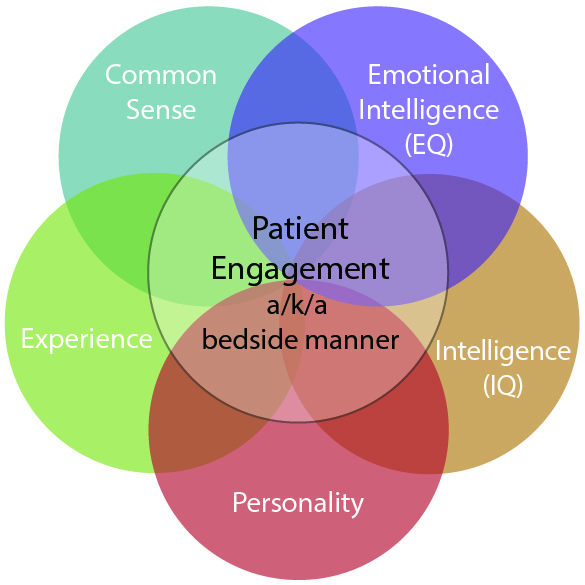
Caring for Patients
Patient engagement is the hot topic lately. Caring about an individual person who is your patient helps create meaningful engagement. It is also important that they know that you care about them. Having all the scientific answers does not make for a good relationship or for meaningful engagement. Obviously, having the medical answers is a vital building block. Understanding a person’s emotional state and having the ability to communicate any information in a way that resonates with that person arises from emotional intelligence. Therefore, to optimize our ability to treat patients, we must maximize our emotional intelligence.
What is Emotional Intelligence?
Emotional intelligence is the capacity to be aware of, control, and express your emotions, and use them to manage interpersonal relationships wisely and empathetically.
Emotional Intelligence consists of 5 primary categories (see Emotional Intelligence: Why it Can Matter More than IQ and Working with Emotional Intelligence by Daniel Goleman)
- Self-awareness
- Self-regulation
- Motivation
- Empathy
- Social skills
Self-awareness is the ability to understand your own feelings, strengths, and weaknesses. It has a direct impact on understanding how your actions affect others. Self-awareness, when married with self-regulation and self-motivation, creates an opportunity to accept and learn from constructive criticism.
Self-regulation is the ability to maturely reveal emotions and exercise restraint when needed. Self-motivation is the ability to take action without prompting from another person. It is a vital feature of emotional intelligence often linked to resilience and optimism.
Empathy is compassion and an understanding of human nature that allows a connection with other people on an emotional level. The ability to effectively empathize allows the physician to provide great service and respond genuinely to others’ concerns.
People who are emotionally intelligent can rapidly build rapport and trust with others. A good starting point is simply to show others respect. Social skills and people skills are not just polite rituals; they are actions that make others more comfortable and help us create success. In this case, success means optimizing health care.

Developing Emotional Intelligence?
Get Adequate Rest
A tired, fatigued person will have trouble concentrating on developing a new skill. Too much energy is focused on simply getting through the day. Get enough hours of sleep to feel refreshed. Avoid bright lights as well as computer, television, and phone screens for at least an hour before bedtime. Work on improving your sleep hygiene. Limit caffeine and other stimulants in the evening. If you have any symptoms of a sleep disorder, address it. Avoid sedative medications as much as possible since these can interfere with the quality of your sleep, even if they do enhance the amount.
Observe Your Feelings
Being self-aware may be an innate skill for some, but it can be learned by most anyone. It is easy to lose touch with our emotions when we’re overwhelmed with work (or all too often, busywork). Instead of taking good care of our emotions, we often ignore them. Ignoring or suppressing emotions makes the situation worse. Poorly managed emotions will block our connection with others.
Emotional reactions can arise from a legitimate source or from some unsolved issue. When negative emotions arise, take a deep breath and analyze the potential cause. Be honest with yourself. Assess the emotion, suppress visceral reactions, and respond to it. The answer may help pave the road towards greater self-awareness and therefore better communication.
Humility
Try to remain humble at heart. Show an outward air of humility. There is always something we can learn from patients and other members of the healthcare team. More importantly, recognizing their importance to the team will help keep you humble.
Curiosity
“I have no special talents. I am only passionately curious.”—Albert Einstein
Curiosity drives the desire for learning and self-improvement. A hectic day can suppress your curiosity. Don’t let stress thwart curiosity. Being curious about a problem or a history draws the patient in and shows your interest in their problem. It will be interpreted as being caring. This creates rapport and helps develop patient engagement.
There are a host of additional tools to use for patient engagement. See Engaging Patients With Staff Engagement and Engaging Patients With Your Portal, for example, or our Top 10 Reasons to Improve Patient Engagement.
And, never forget the importance of the human touch!
Watch the video below to learn more about emotional intelligence from Daniel Goeman.
Follow us on Twitter, Facebook, and LinkedIn to join the conversation about growing your practice.


